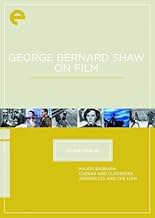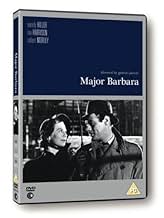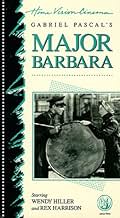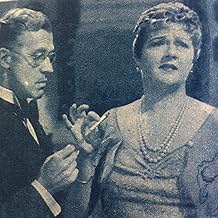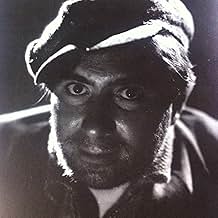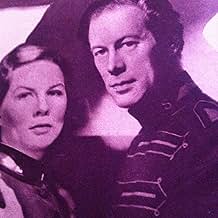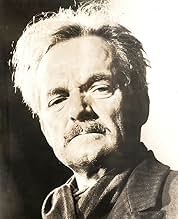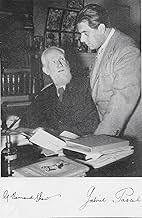Uma jovem idealista do Exército da Salvação, filha de um magnata das armas, salvará mais almas comandando os negócios do pai.Uma jovem idealista do Exército da Salvação, filha de um magnata das armas, salvará mais almas comandando os negócios do pai.Uma jovem idealista do Exército da Salvação, filha de um magnata das armas, salvará mais almas comandando os negócios do pai.
- Direção
- Roteiristas
- Artistas
- Prêmios
- 1 vitória e 1 indicação no total
Avaliações em destaque
This film is an extraordinary historical document! I haven't seen its political philosophy expressed or epitomized anywhere so well as in the movie's final act. The fact that it was filmed in London during The Blitz bombing of 1940 helps provide the production with the behind the scenes gravity or, as Robert Morley's character says , the "anxiety" to make its ideological sentiments, which could easily ring hollow, seem credible. In fact, somehow the movie's Fabian Democratic Socialism manages to surpass even Ayn Rand in its view of man as the measure of all things, thanks to the cagey implication that technological "progress" is the fulfillment of Christian ethics and that the elite are our saviors. "You may be a devil, but sometimes God speaks through you."
This and HG Wells' Things to Come are like comedic and tragic bookends for the Utopian vision of technology as Heaven on Earth, of the industrialist as saint. Here, like a freshly minted coin, before it was cynical or retro, before the appearance of Its antipode, the cinematic Dystopian Hells of the second part of the Twentieth Century, we see the vision of "modernism" in all its glory. Heaven is the "Future" and a secular Holy city of Jerusalem descends from Heaven as the modern industrialized city. This vision of a socialist utopia ruled by an enlightened elite has played a bigger role in our history than is generally acknowledged. It is not acknowledged because the system was successfully implemented, after which it was inconvenient to talk about its existence. Particularly because it was necessary to sustain a false narrative to "steer the 'democracy' from behind the scenes". Predictably this has became leading by deception. This need for deception may have been may anticipated by Fabian social architects like George Bernard Shaw and H.G. Wells as a necessary evil. I would guess that the way such systemic lying leads to corruption may not have been part of the ideology.
Did our self-appointed elite "fallen angels" get lost somewhere along the way and became drunk with unprecedented power and, rather than thinking "God speaks" through them, get seduced into deifying themselves? Or were they themselves manipulated all along by others who had always deified themselves? I'm sure some of our current leaders still believe in this vision, the ones who are not gangsters, Satanists, or both.
To his credit Brad Byrd took a stab at addressing this situation in Tomorrowland.
Film adaptations of his plays are a mixed bag, to put it mildly and some are too risible to mention. The greatest is indisputably the 'Pygmalion' of Anthony Asquith. The superlative editing on that film is courtesy of David Lean who fulfils that role once more in 'Major Barbara' and also acts as assistant director to Gabriel Pascal. How much influence Lean and fellow assistant Harold French had on the film is unknown but one thing is certain: Pascal is no Asquith!
The title character is another of Shaw's strong females and she is played by Wendy Hiller who had already excelled as Eliza Doolittle. To portray a character who is intensely 'moral' without being self-righteous is no easy task and Miss Hiller manages to pull it off. Rex Harrison is Cusins, her devoted admirer, who is based on classical scholar/humanist Gilbert Murray. This part marks the start of Harrison's long association with the works of Shaw culminating in his Tony Award in 1984 as Captain Shotover in 'Heartbreak House'.
David Tree had beautifully played Freddie in 1938 as a harmless twit and does so again here as Cholly Lomax. Marie Lohr is suitably imperious as Lady Britomart. This is not exactly Emlyn Williams' finest hour and his Cockney accent is atrocious. His portrayal epitomises the film's rather patronising attitude towards the 'lower orders' whilst Robert Newton is simply stupendous as malcontent Bill Walker and little wonder that Lean would later cast him as Bill Sykes.
In Shaw's plays there is invariably a Shavian 'realist', some might say 'cynic', whose voice is that of Shaw himself and whose function it is to utter incisive and unpalatable truths about the human condition. In this we have the fascinating Andrew Undershaft, known affectionately as the 'Prince of Darkness'. He is a self-made man who has made his millions as a munitions manufacturer and who regards 'poverty' as the greatest of all crimes. Although a little too young for the part he is played superbly by Robert Morley. One of his best scenes is with his son Stephen, played by Walter Hudd, who was in fact eleven years older than Morley. He advises him that as a man who knows nothing but who thinks he knows everything, a career in Politics beckons!
The play also takes a swipe at religion, which didn't exactly increase its popularity in the United States.
Undershaft declares that 'being a millionaire is my religion' and Barbara herself realises that she must pursue her religious aims through the capitalists 'whose hands stretch everywhere'.
Shaw was born in 1856 and it is marvellous to think that he was still around in 1941 to 'collaborate' on the script.
Lean's editing is again exemplary and the production design of Vincent Korda, especially that of Undershaft's 'Death Factory', is magnificent.
Fine score by one of our greatest composers, William Walton.
Although this film misses the Asquith touch it is, all-in-all, a very satisfactory version of Shaw's morality tale in which it is not the love of money but the lack of it that is the root of all evil. The happy Hollywood-style ending is not exactly what the playwright had in mind but is obviously there so as to send wartime audiences out of the cinema wearing a smile.
The essential question in "Major Barbara" concerns the root of the Industrial Age's social ills. Barbara (well-acted by Wendy Hiller) would argue that the greed of whiskey manufacturers and the social rapacity of the ruling classes are the culprits. Her father, on the other hand, maintains that civilization's greatest sin is the existence of poverty. Further, he deplores the shameless glorification of the "meek, honest, and downtrodden" poor and the empty condescension that is offered to those who live in filth, disease, and constant hunger. And since Andrew Undershaft is the play's hero and Shaw's philosophical stand-in (Robert Morley, the actor who plays him, is even made up to resemble Shaw), there can be little doubt as to which character, father or daughter, will ultimately triumph.
Since Shaw was directly involved in this project, it's doubtful that purists will object to the fact that the film includes additional scenes that did not appear in the play's original text. A new prologue introduces us to Adolphus Cusins (Rex Harrison), the professor of Greek classics who is a dismal failure as a Hyde Park lecturer. When his speeches fail to hold or entrance an audience, he is advised by a sympathetic street patrolman (Stanley Holloway) to sample the "religious" speaking-circuit. Deciding he has nothing to lose, Adolphus heeds the policeman's advice, and while doing so, he encounters Barbara speaking to a crowd with incredibly religious fervor, and he is instantly smitten. From there, the movie segues into Shaw's original First Act.
Another important addition is the mock religious conversion of the drunken Bill Walker by wrestler-turned-Salvation-Army-sergeant Todger Fairmile, a scene only described in Shaw's original transcript. Robert Newton, a very fine actor who was especially memorable in Hitchcock's "Jamaica Inn" (1939), here plays Walker as an unbridled, unapologetic savage of a bully. His profane dismissals of the aged Miss Mitchens and the quickness of his physical abuse of the docile Army volunteer Jenny Hill provide the film's most shocking moments. But Walker's more lethal ammunition is used in his verbal taunting of Barbara ("What price Salvation, now?") after her disillusionment with and ultimate resignation from the Army of Good Samaritans. So deep is her despair that she almost commits suicide.
Her abandonment of the Army occurs after her superior accepts a large gift of money in the form of a check signed by her own father. Barbara insists that the money is tainted, that its blood money, gleaned from her father with the sweat of his underpaid workers and by the misery suffered by the victims of Undershaft's armaments industry. However, when reluctantly following up on her father's invitation to visit his munitions plant, she discovers that Undershaft's company town is a working-man's suburban paradise of modern architecture and schools and churches; and she then understands that it is not her father who drives the hellish multimillion-dollar business that makes this Eden possible. It drives him. And the film's concluding shot of Cusins, Walker, and Barbara, marching arm-in-arm with the rest of Undershaft's proletariat, is a celebration of the playwright's ironic vision.
Shaw is primarily enjoyed for the intelligent wit of his dialogue, but he had a serious purpose here. As the playwright himself reflected in 1906, a year after the play's premiere, "Undershaft...is simply a man who, having grasped the fact that poverty is a crime, knows that when society offered him the alternative of poverty or a lucrative trade in death and destruction, it offered him (a choice) between energetic enterprise and cowardly infamy."
Gabriel Pascal produced and directed adequately. Here, his style is very understated and completely serviceable to the film's source. The scenes are paced briskly, even by modern standards. And the casting is superb, particularly Emlyn Williams's two-faced cynic/beggar, Snobby Price (the name says it all); Deborah Kerr is an affecting Jenny Hill (she obtained this film role by reciting the Lord's Prayer for producer Pascal); Torin Thatcher is in fine comic form as Todger Fairmile; and Marie Lohr manages to quietly hit all the right notes as Undershaft's priggish wife, Lady Britomart.
Você sabia?
- CuriosidadesFilming went on through the German Blitz. Producer and Director Gabriel Pascal had his own spotter on the roof who blew a horn when he spied German planes. According to Ronald Neame, nobody had told Wendy Hiller, so when the horn sounded during a rehearsal and everybody left, Hiller was bewildered.
- Erros de gravação(at around 1h 35 mins) Just before she scolds her husband for addressing her as "Biddy", a boom mic shadow passes over the lace trim on the bosom of Lady Britomart's (Marie Lohr) gown.
- Citações
Andrew Underschaft: [to son, Stephen] Well, is there anything you know or care for?
Stephen Underschaft: I know the difference between right and wrong.
Andrew Underschaft: You don't say so! What? No capacity for business? No knowledge of law? No sympathy with art? No pretention to philosophy? Only a simple knowledge of the secret that has baffled all the lawyers, muddled all the men of business, and ruined most of the artists - secret of right and wrong. Why man, you're a genius. A master of masters. A god. And at 28, too.
- Versões alternativasA long final speech by Undershaft (Robert Morley) was filmed but cut before release. The National Film Theatre showed this version many years ago. The British Film Institute lists a print running 136 minutes - some 15 minutes longer than the released version - which presumably is that version.
- ConexõesFeatured in Discovering Film: Rex Harrison (2015)
- Trilhas sonorasHow Sweet the Name of Jesus Sounds
(uncredited)
Music by Alexander Reinagle (1836)
Words by John Newton (1779)
Arranged by William Walton
Principais escolhas
- How long is Major Barbara?Fornecido pela Alexa
Detalhes
- Data de lançamento
- País de origem
- Idioma
- Também conhecido como
- George Bernard Shaw's Major Barbara
- Locações de filme
- Royal Albert Hall, South Kensington, Londres, Inglaterra, Reino Unido(Salvation Army rally scene)
- Empresa de produção
- Consulte mais créditos da empresa na IMDbPro
- Tempo de duração2 horas 11 minutos
- Cor
- Proporção
- 1.37 : 1
Contribua para esta página


